Tuesday Feb 17, 2026
Tuesday Feb 17, 2026
Monday, 25 April 2022 01:26 - - {{hitsCtrl.values.hits}}
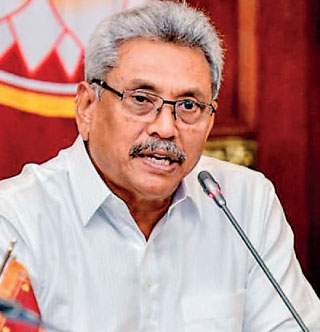
President Gotabaya Rajapaksa
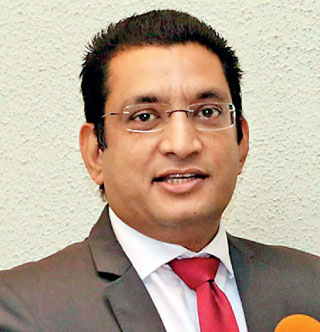
Finance Minister Ali Sabry
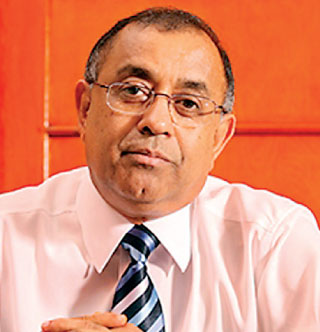
Former President’s Secretary Dr. P.B. Jayasundera
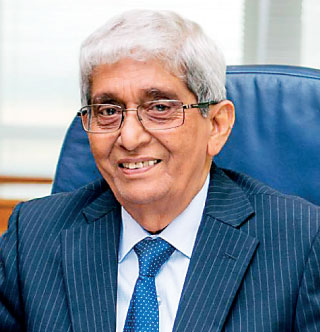
Former Central Bank Chief W.D. Lakshman
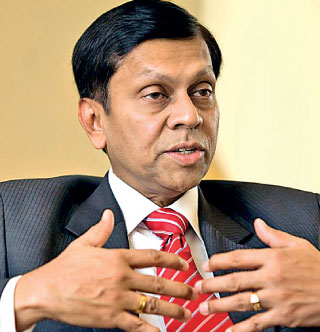
Former Central Bank Chief Ajith Nivard Cabraal
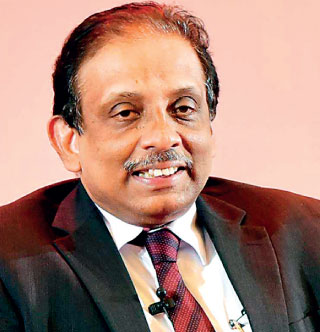
Former Treasury Secretary S.R. Attygalle
|
 At last, IMF is viewed as the saviour
At last, IMF is viewed as the saviour
The Sri Lankan team headed by Finance Minister Ali Sabry has been in negotiation with the officials of the International Monetary Fund, popularly known as IMF, for a credit facility to overcome Sri Lanka’s acute Balance of Payments or BOP problem. The team had been jubilant over its success as revealed by a media statement issued by the Ministry of Finance. However, IMF’s Sri Lanka mission chief Masahiro Nozaki has told Reuters by email that discussions are still at an early stage and a pre-condition for a Fund facility has been having a debt sustainability scheme in place.
What this means is that it is a tough negotiation for the Sri Lanka team. Obviously, it should be the case because Sri Lanka had allowed the economy to be paralysed by refusing to go to IMF despite the mounting pressure for same for more than 15 months. The decision to avoid IMF had been made by the chief policymakers of the Government made up of President’s Secretary Dr. P.B. Jayasundera, Central Bank Chiefs W.D. Lakshman and later Ajith Nivard Cabraal, and the Treasury Secretary S.R. Attygalle. They had convinced the President Gotabaya Rajapaksa who is a green horn in economic matters that they had an effective homegrown policy that obviates the need for seeking IMF’s intervention.
In fact, Governor Cabraal had presented this homegrown policy in a six-month road map revealed on 1 October 2021. It had overestimated the inflows of foreign exchange to the country, and as a result, the forex situation deteriorated by the day. The drying up of the foreign exchange in the formal banking systems and the depletion of the Central Bank’s foreign reserves to near zero level caused an acute shortage of raw materials for industries and essential goods for consumers causing long queues to appear on one side and thriving of a black market for dollars on the other. Finally, the rupee was floated without adequate preparation driving it to wild fluctuations in the market. By this time, all the four policy leaders have lost their jobs.
Gotabaya admits his policy follies
Earlier President Gotabaya Rajapaksa addressing new ministers admitted that Sri Lanka would have gone to IMF earlier and denying chemical fertilisers and pesticides to farmers was a mistake. This shows the President’s naivety in these matters. When President J.R. Jayewardene had been told by everyone that Sri Lanka should seek assistance from IMF and the World Bank in late 1970s, the doubtful JRJ had sought expert opinion on the matter. He had invited Singapore’s first finance minister and then its deputy prime minister Dr. Goh Keng Swee to advise him on the matter. Goh had presented a 27-page report to JRJ recommending that Sri Lanka should obtain both IMF and World Bank support for its chronic economic problems. Had Gota also sought expert views on the subject instead of relying on the 4-gang policy advisors, he could have avoided the present economic catastrophe which is now threatening the continuation of his administration.
|
A tough negotiation for the Sri Lanka team
Gota has said that both errors have now been corrected. However, he had admitted only two of the many policy errors his administration had made since assuming presidency in November 2019. They still need be corrected and it is because of this lapse that the negotiation with IMF has become a tough affair for the Sri Lankan team. Echoing this policy correction requirement, IMF’s Managing Director Kristalina Georgieva had put a message on her Twitter account that Sri Lanka and IMF had discussed the policy actions to address economic challenges and undertook to work together to map a pathway for the country’s economic recovery. Though these policy actions had not been spelt out by Kristalina, a feel of them could be got by referring to the latest IMF staff report on Sri Lanka under its Article IV Consultations.
IMF: Increase Government revenue
The first policy action it had recommended was that Sri Lanka should increase its Government revenue by increasing income taxes and value added taxes through quality revenue measures. This effectively requires the Government to go back to the tax system that had prevailed prior to 2019 and not to use such arbitrary taxes like the surcharge tax on past profits of high profit makers and increase in VAT on financial services. The tax system was corrupted by the Gotabaya administration in December 2019 by committing a serious economic folly by offering an unsolicited highly attractive tax concession to both income tax VAT payers.
This created a huge dent in revenue amounting to about 4% of GDP and the Government is still suffering from this dent. When this was announced in the election manifesto, I warned him against the implementation of this disastrous measure in December 2019 in an article in this series (available at: https://www.ft.lk/columns/Tax-cuts-Control-the-damage-before-the-unconventional-stimulus-backfires/4-691207).
Subsequently, on two occasions the Government was requested by me not to implement that tax package (available at: https://www.ft.lk/columns/Constrained-fiscal-space-for-post-COVID-19-reconstruction-Consider-postponing-costly-tax-reforms/4-700327 and https://www.ft.lk/columns/Challenge-before-the-new-Finance-Minister-Choice-between-pragmatism-and-dogmatic-ideals/4-720282). This loud voice was not heard by the administration because its top policy leaders had been imbibed by their own heavy intoxication of non-working homegrown policies. Now, IMF has warned Ali Sabry that the Government should take measures to fill the coffers that have been empty.
IMF: Free the exchange rate
The second policy prescription was the freeing of Sri Lanka’s exchange rate from the strict control of the Central Bank. What IMF has suggested was not the wild floating that is happening now but a planned floating as Sri Lanka had done in January 2001 with support from the Fund. Despite the mounting pressure for the rupee to depreciate in the market, the Central Bank under both W.D. Lakshman and Ajith Nivard Cabraal had kept it at Rs. 200 per dollar by wasting the country’s foreign reserves.
Consequently, the foreign reserves fell from $ 7.6 billion in December 2019 to $ 1.9 billion at end-March 2022 by $ 5.7 billion. This loss would have been avoided had the Central Bank allowed a gradual floating from early 2020. When the usable reserves were near zero, the Bank had to give up its elusive goal of holding onto Rs. 200 per dollar in late March. Thus, the floating was done not by choice but by circumstances.
|
IMF: Ensure debt sustainability
The third policy prescription relates to IMF’s observation that Sri Lanka’s debt sustainability is weak, and the country should start a program on debt restructuring. Sri Lanka’s foreign debt has been a critical issue because the Government led by the present Prime Minister Mahinda Rajapaksa had borrowed from commercial and bilateral sources and invested in projects which were not paying back even in Sri Lanka rupees. The Lotus Tower rising to the sky in the city of Colombo is a case in point. As a result, much needed foreign exchange to service these loans was not earned by Sri Lanka as indicated by the falling ratio of exports to GDP from high 26% in 2005 to 12% today. Naturally, foreign debt is unsustainable and cannot be serviced.
It is in this background that the Ministry of Finance announced that Sri Lanka will not service its debt falling due from 5 p.m. on 12 April 2022 with the objective of restructuring the same. Toward this end, requests for proposals were called for appointment of legal and financial advisors but they are yet to be appointed. Hence, it might take another 3-4 months for Sri Lanka to formally restructure its debt. In the meantime, the country’s credit rating has been cut to the lowest level possible at C or Ca or CC by all the three rating agencies. This is imminent default rating and as a result, when the sovereign gets that rating, all the entities within the State including commercial banks will also get the same rating. The Gotabaya Rajapaksa administration should appreciate this catastrophic situation it is in.
IMF: Tighten monetary policy to curtail inflation
The fourth policy prescription says that Sri Lanka should tighten monetary policy amidst rising inflation. Official rates show that it is at 22% but the global inflation tracker, Steve Hanke of the Johns Hopkins University, by using the purchasing power parity theory has put it at 120%. Along with this, the Central Bank has been advised by IMF that it should not accommodate the funding requirement of the government which has already increased by Rs 3.2 trillion or 118% during the 26-month period since December 2019.
Consequently, the money stock has increased by Rs. 3.1 trillion or 41%. When the real economic growth during this period has been just 1%, this is recipe for uncontrollable inflation to hit the country in the period ahead. So, interest rates are bound to double or treble in the coming months derailing quick economic recovery prospects. At the present state, inflation has been reckoned as the public enemy number one. The Central Bank will look at growth matters only after this enemy has successfully been defeated.
IMF: Make Central Bank independent
The last prescription has been that the Central Bank should be made independent from political interferences. I have analysed this issue and demanded for Bank’s independence from the undue interference from the Ministry of Finance when I delivered the 68th Anniversary Oration of the Central Bank in 2018 (available at: https://youtu.be/2DWd4LdcJrw). There had been a new central banking law drafted by a committee under the chairmanship of the present Governor Nandalal Weerasinghe when he was the Senior Deputy Governor of the Bank. This bill had been accepted by the then Good Governance government and was about to be tabled in Parliament when Gotabaya Rajapaksa was elected President in November 2019. He shelved this for reasons known only to himself and his chief policy advisors. Had he not done it at that time, IMF would not have made this demand today. Therefore, it is a matter for the current Parliament to retrieve it from its archives and enact it as a matter of priority.
|
Sri Lanka would have sought IMF support much earlier
Thus, getting a credit line from IMF is not a cakewalk but a battle saddled with a tough negotiation. Sri Lanka’s bargaining position is weak because all its macroeconomic indicators depict ailments beyond recovery even under the care of medical experts. Had Sri Lanka gone to IMF when we asked the administration to do so in the middle of last year, much of the things which the country has lost now could have been saved and the negotiators could have presented themselves before the IMF team with confidence (available at: https://www.ft.lk/columns/Forex-crisis-plea-for-calmness-in-national-interest-and-need-for-getting-IMF-driven-bailout/4-719992 and https://www.ft.lk/columns/IMF-or-not-What-other-options-are-available-for-Sri-Lanka/4-721142). It seems now a losing battle, but it is still worth trying out for a breakthrough in securing a funding line from IMF.
IMF funding is necessary but not sufficient
Many seem to be harbouring the belief that if Sri Lanka gets a bailout from IMF now all its economic woes are settled. That is not the case because IMF will help Sri Lanka to resolve its financial sector issues and that resolution is necessary but not sufficient for the country to get back to a high growth path. That part should be settled through the establishment of conditions conducive for growth to take place on one side and the introduction of a proper real sector plan, on the other. It is the responsibility of the Government and not of the Central Bank or IMF to establish these conditions and introduce such a plan.
Bring back 19th Amendment plus
The conditions that are conducive for long-term economic growth are the establishment of a good governance regime, observance of the rule of law, maintenance of law and order, and promotion of a healthy institutional setup in Sri Lanka. Sri Lanka has attempted to reach this goal by introducing the 19th Amendment to the Constitution in 2015. That was the beginning of a process that would have taken a long time to accomplish. However, it was reversed in 2019 by introducing the 20th Amendment to the Constitution.
When this was debated in Parliament, I tried to put sense to the legislators who were planning to vote for the amendment by highlighting the virtues of the 19th Amendment and what they would lose as a result of enacting the 20th Amendment (available at: https://www.ft.lk/columns/Maligned-19th-Amendment-Are-critics-aware-of-its-value-for-sustained-prosperity/4-704997 and https://www.ft.lk/columns/Economic-policy-governance-a-must-if-good-governance-to-succeed/4-705339). Now it is revealed that those who had voted for it are regretting the choice they had made in 2019. Hence, as a matter of priority, the 20th Amendment should be annulled, and a stronger 19th Amendment should be enacted.
Have a long-term development plan
Simultaneously with an IMF-led bailout supported by a proper legislative reform, the Government should come up with a medium to long-term growth plan to push the country’s growth up and bring prosperity to its people. This requires Sri Lanka to move away from the present manufacturing pattern of producing under the conditions of the Second Industrial Revolution and seamlessly integrate with the Fourth Industrial Revolution that is in vogue today. For this, Sri Lanka has to bypass the Third Industrial Revolution and it is not an impossibility for the country provided it adopts a suitable strategy and continue with that strategy over years.
In this connection, Sri Lanka can learn a valuable lesson from Vietnam which introduced a 10-year road map in 2020 to convert its economy to a high-tech manufacturing country by 2030 (available at: https://iotbusiness-platform.com/insights/vietnam-immersing-herself-in-the-industry-4-0-flow/). Vietnam has followed in this connection the example set by Thailand (visit: https://www.linkedin.com/pulse/aibp-thailand-media-workshop-takeaway-collaboration-asia-iot/), Indonesia (visit: https://iotbusiness-platform.com/insights/aibp-indonesia-media-briefing-takeaway-indonesian-stakeholders-are-ready-for-indonesia-4-0/), and Malaysia (visit: https://grp.miti.gov.my/miti-grp/resources/Public%20Consultation/Industry4.0FrameworkLayout_PublicReview(9Feb)V3_.pdf). Sri Lanka is a laggard in this connection, and it should reframe its policy strategies to attain this goal over the next decade or so.
Thus, IMF will help Sri Lanka to survive through the current financial sector crisis. It is only a half of the battle which it must win. The full victory will come only when it has a proper real sector plan, supported by a conducive governance structure, to integrate the economy to the Fourth Industrial Revolution seamlessly.
(The writer, a former Deputy Governor of the Central Bank of Sri Lanka, can be reached at [email protected].)